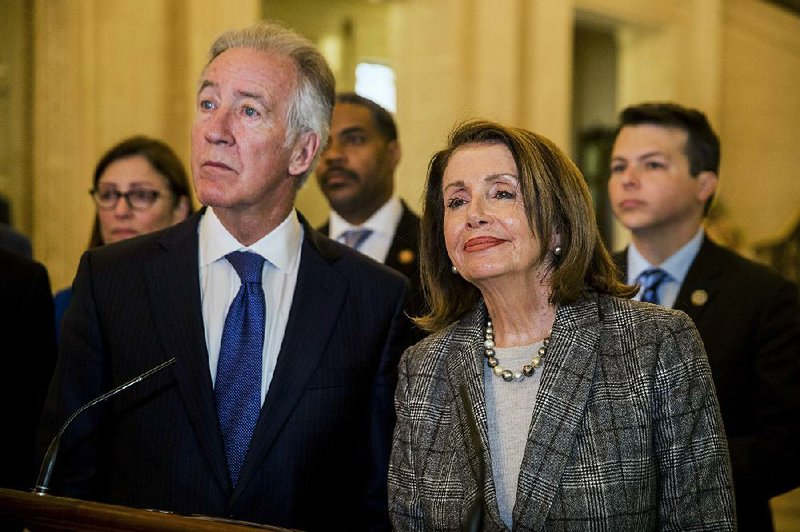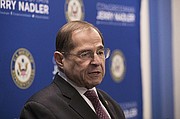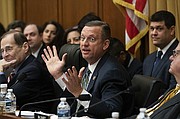WASHINGTON -- The chairman of the House Judiciary Committee issued a subpoena Friday for special counsel Robert Mueller's report as Congress escalates its investigation of President Donald Trump.
"It now falls to Congress to determine the full scope of that alleged misconduct and to decide what steps we must take going forward," said Rep. Jerrold Nadler, D-N.Y. He expects the Justice Department to comply by May 1.
While Mueller declined to prosecute Trump on obstruction of justice, he did not exonerate the president.
"My committee needs and is entitled to the full version of the report and the underlying evidence consistent with past practice," Nadler said in a statement.
But the committee's top Republican, Rep. Doug Collins of Georgia, said the subpoena was "wildly overbroad" and that Trump already declined to assert executive privilege in a move of "unprecedented openness." Collins said Nadler was rushing the process for political gain.
"The attorney general offered up a 400-page report that he wasn't bound to provide," Collins said. "The attorney general stands ready to testify before our committee and to have the special counsel do the same. Yet Chairman Nadler disregards all of this good faith transparency without even taking the department up on its offer to review material under the redactions."
Attorney General William Barr sent Congress a redacted version of the report, blacking out several types of material, including classified information, material pertaining to ongoing investigations and grand jury evidence.
Stephen Boyd, an assistant attorney general, wrote in a letter that the Justice Department would allow the bipartisan leaders of the House and the Senate, as well as the heads of their judiciary and intelligence committees, to view a fuller version of the report beginning next week. But he said even that copy would still have secretive grand jury information blacked out because of legal requirements.
Given the sensitive nature of the information, Boyd wrote, "all individuals reviewing the less-redacted version" must agree to keep the newly unredacted information confidential.
Democrats in both the House and the Senate rejected the proposed accommodation as insufficient Friday. "Unfortunately, your proposed accommodation -- which among other things would prohibit discussion of the full report, even with other committee members -- is not acceptable," wrote the Democrats, including Nadler and other top members in the House and the Senate. They said they were "open to discussing a reasonable accommodation with the department that would protect law-enforcement-sensitive information while allowing Congress to fulfill its constitutional duties."
Nadler on Friday said he is open to working with the department but that he "cannot accept any proposal which leaves most of Congress in the dark, as they grapple with their duties of legislation, oversight and constitutional accountability."
The materials are due the day Barr is to testify before a Senate committee and one day before Barr is set to appear before Nadler's committee. Nadler also has summoned Mueller to testify.
IMPEACHMENT TALK
Republicans are eager to move beyond what Trump calls the "witch hunt" that has overshadowed the party and the presidency. While Democrats say Mueller's findings are far more serious than initially indicated in Barr's four-page summary last month, they've been hesitant to pursue impeachment proceedings despite pressure from the left flank of the party to begin efforts to try to remove the president from office.
Rep. Alexandria Ocasio-Cortez, D-N.Y., is now signed on to an impeachment resolution from fellow Democratic Rep. Rashida Tlaib of Michigan. Sen. Elizabeth Warren, D-Mass., a presidential candidate, said Friday that the House "should initiate impeachment proceedings against the president."
House Speaker Nancy Pelosi, traveling Thursday on a congressional trip to Ireland, said in a joint statement with Senate Democratic Leader Charles Schumer that Mueller's report revealed more than was known about the obstruction question.
"As we continue to review the report, one thing is clear: Attorney General Barr presented a conclusion that the president did not obstruct justice while Mueller's report appears to undercut that finding," they said.
Later, in a letter to House Democrats, Pelosi vowed: "Congress will not be silent."
Pelosi has scheduled a conference call for all House Democrats on Monday to discuss the implications of what she called "a grave matter."
Mueller laid out multiple episodes in which Trump directed others to influence or curtail the Russia investigation after the special counsel's appointment in May 2017, and Trump made clear that he viewed the probe as a potential mortal blow -- "the end of my presidency."
Rep. Adam Schiff, the chairman of the House Intelligence Committee, said the acts described in the report, "whether they are criminal or not, are deeply alarming in the president of the United States. And it's clear that special counsel Mueller wanted the Congress to consider the repercussions and the consequences."
Schiff, D-Calif., said that "if the special counsel, as he made clear, had found evidence exonerating the president, he would have said so. He did not. He left that issue to the Congress of the United States."
Republicans sought to portray Democrats as unwilling to let go of the idea that Trump colluded with Russia to swing the election. "What you're seeing is unprecedented desperation from the left," tweeted Rep. Mark Meadows, R-N.C. "There was no collusion. It's over."
Other Republicans were measured. Senate Majority Leader Mitch McConnell, who is one of the few members of Congress mentioned in the report, told reporters in Kentucky, "It's too early to start commenting on portions of it."
McConnell was among several people the report said former White House Counsel Donald McGahn had reached out to on behalf of the president when Trump was trying to stop then-Attorney General Jeff Sessions from recusing himself at the start of the Russia probe.
In all, the report revealed 10 areas of potential obstruction, from Trump's firing of FBI Director James Comey to his attempts to thwart Mueller's investigation. In many cases, the additional details show a president restrained only by aides and others around him.
Rep. Jamie Raskin, D-Md., a member of the Judiciary Committee, said his reading of the report shows that Trump "almost certainly obstructed justice" and it was only his staff that intervened to prevent certain actions.
RUSSIAN MEDDLING
The Kremlin on Friday rejected the findings in Mueller's report of Russian interference in the 2016 U.S. presidential election, calling it inconclusive in establishing any such meddling and damaging to U.S.-Russian relations.
The report "still does not present any conclusive evidence of alleged interference by the Russian Federation in the electoral process in America," Kremlin spokesman Dmitry Peskov told reporters Friday. "We continue to refuse to accept any such accusation."
The report extensively details efforts by the Russian GRU military intelligence service to hack servers at the Democratic National Committee and a campaign waged by the Internet Research Agency to influence American voters ahead of the 2016 contest. The agency is owned by Yevgeniy Prigozhin, an associate of Russian President Vladimir Putin.
"In the form it's been published in, the Mueller report does not contain any new information," Peskov told reporters in Moscow. "Everything in it has already been reported by the media in one way or another." Peskov, who serves as Putin's spokesman, also lamented that the report and the nearly two-year investigation it was based on have harmed U.S.-Russian relations, which have been in steady decline since 2014.
When asked about several Russian businessmen who feature in the Mueller report, Peskov said they had briefed Putin on their activities and contacts in the United States.
"They reported the most important [contacts] and probably didn't mention other, less important ones," he said. "It isn't presidential level."
Peskov said their activities were normal for international business executives.
Information for this article was contributed by Lisa Mascaro, Mary Clare Jalonick, Padmananda Rama, Jennifer Peltz and Dylan Lovan of The Associated Press; by Nicholas Fandos of The New York Times; and by Matthew Bodner of The Washington Post.
A Section on 04/20/2019



